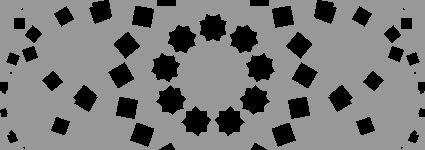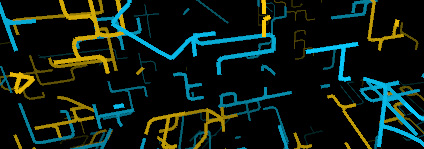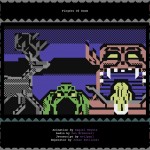I’ve recently being playing with Processing. It’s described as “an open source programming language and environment for people who want to program images, animation, and interactions“, and it aims “..to serve as a software sketchbook and professional production tool.”
So what does this mean to me? In short it means that I can quickly write some cool looking music visualisers and, because Processing is rather friendly, I can easily export them so that they run in your web browser! Below are three sketches that I’ve written in the past week or so of my Processing experiments. Click on the images to (fingers crossed!) run them. I say “fingers crossed” because the browser implmentation of Processing seems a bit flaky – sometimes I get errors, sometimes I get nothing and sometimes, if I’m lucky, the things even run perfectly. If you do get problems, please just keep trying!

(click here to run the applet in a browser)
(click here to download the windows applet version)

(click here to run the applet in a browser)
(click here to download the windows applet version)

(click here to run the applet in a browser)
(click here to download the windows applet version)
Why all the interest in Processing then? Well, I’ve heard about it a lot over the past year or two. It seems that quite a few digital artists have picked it up and are running with it, and I keep thinking that I too should take a look sooner or later. It turned out to be sooner, when the Windows partitiion on my Macbook Pro stopped working. I do most of my coding in Windows, so this brought an abrupt end to all of that. Luckily, not only was my OSX partition was still fine but the Processing IDE is Mac friendly.
Processing has proven incredibly easy to get into. It’s Java based and comes with not only a simple IDE but also a huge number of libraries, examples and tutorials. The online support forums and reference guides are also pretty impressive.The language itself is definitely geared more towards experimentation and learning than development of full-blown applications. The fact that Processing programs are called “Sketches” makes that obvious from the start. I’ve certainly found it liberating to work in such an experimental fashion, though, and I’ll probably be incorporating some of things I’ve learned back into my main codebase when I finally find the time to reinstall Windows. Will I continue to play with Processing when that’s done? Yeah, I probably will. The speed with which I can code these sketches can be very impressive. The second and third sketches above only took about half a day’s work each, and they are the perfect antidote to working on large-scale projects.







Great to see a few more people from the demo scene taking an interest in Processing. I’m using it for building interactive visual apps, although eventually want to do more music reactive stuff.
If you find your code is slowing down on Processing (Java ain’t the fastest!) then the next step is to move it on to openFrameworks .. but you folks would probably be better off just coding it up the old fashioned way at that point.
Enjoying your work, nice to see the UK demoscene really pushing forwards. Also nice to see V&A displaying digital art, went to it last week, it was inspiring. The digital arts stuff at Sonar festival is usually bigger and better, but it is an important step that somewhere like the V&A displays digital art. Even Chatsworth house has a digital portrait of Lady Burlington now days :)
Nice one mate, looks good and an interesting sidestep from the hacking of the demoscene :) If I had the time i’d be investigating doing some of this stuff also as I have been thinking outside of the demoscene for quite some time now, Maybe this sort of stuff mixed with my skills in the design department would be good.. using aftereffects etc. Oh btw, loved the Decode-Recode thing, this is what we need, more expansion into other scenes. look forward to further work mate.. btw, I cant find an RSS feed on this blog to keep up to date??
hi HoTWire btw, HotWire/ex-twisted? :) long time :)
oh scrub that, finally found the rss at the bottom of the page :D
hey!! Long time no see indeed.. yup one and the same, still floating around the place. I’ve read Digital Graffiti without realising it was yours! Good to see the UK demo scene is in fine health. I hooked up with some of those crazy Finnish guys and dissapeared into media/visuals stuff. Demoscene seems to be converging a little with where we are, this is great.